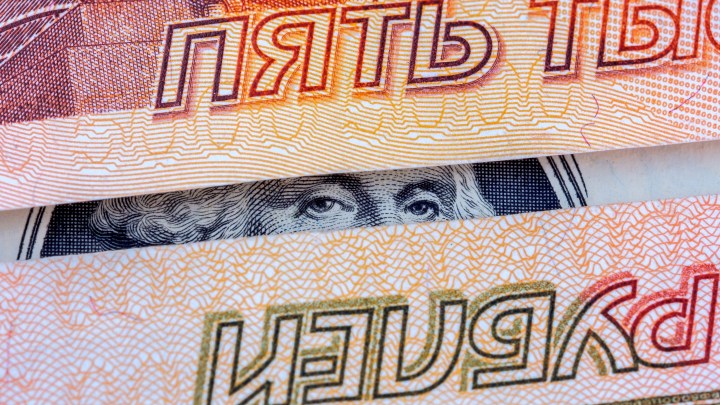
Could the U.S. have weakened its financial clout by using it to sanction Russia?
Could the U.S. have weakened its financial clout by using it to sanction Russia?

The sanctions just keep right on coming: Last week, the U.S. Treasury said it’s applying them to 21 “entities” and 13 individuals connected to the Russian tech sector, the idea being to prevent that country from accessing advanced technology from the U.S.
This is on top, of course, of blocking Russia from the SWIFT system of interbank messaging, freezing the assets off Russia’s central bank and a long list of other sanctions on Russian banks and businesses.
Now, one reason the U.S. levied these sanctions is because it could. The U.S. dollar is the most widely used currency internationally and the U.S. financial system touches just about every corner of the globe.
But could actions by the U.S. end up hastening the arrival of the day when those things are not as true and the U.S. doesn’t have as much power to actually impose worldwide sanctions?
The dollar can be found far beyond U.S. borders.
“A great deal of trade is denominated in dollars — you quote the price of a barrel of oil, even between China and Venezuela, they quote it in dollars,” said Ken Rogoff, a professor of economics at Harvard. “The footprint of the dollar is roughly three times the size of our economy if you look at the U.S. share of trade or world GDP.”
And much of the world’s financial deal-making at least touches the U.S. financial system — which gives the U.S. leverage. “The U.S. controls a lot of the inner workings of the global financial system,” Rogoff said.
Since Russia’s invasion of Ukraine, the U.S. has pushed the levers of its financial power to nearly full tilt, even going so far as to freeze the reserves that Russia’s central bank held around the world.
“That’s really the nuclear option in this game,” Rogoff said. That, he said, was a shock — not just to Russia, but to China as well. “And the Chinese, they’re not saying anything, they’re going to move very quietly. But I can assure you behind the scenes, they are talking about how they can move faster than they were planning.”
Move faster to establishing Chinese currency — traditional or digital — as a global leader, particularly in Asia. And move faster to fortify its own payment system. Russia’s internal payment system, for example, protected its domestic credit card industry from U.S.-led sanctions. It’s reportedly seeking to export that system to Venezuela and Iran.
“The more we use sanctions, the less the dollar and our banking system are viewed as benign to everyone, and it creates pressures for others to find workarounds,” said Scott Kennedy, a senior fellow at the Center for Strategic and International Studies.
Take, for example, global payments systems. “Payments are a network economy subject to tipping points,” said Aaron Klein, a senior fellow at the Brookings Institution. “That is, payment systems work and people don’t want to start new ones. It’s very difficult, but at some point that could reach a tipping point where there’s enough incentive for other countries to figure out an alternative.”
So then is the world reaching a tipping point or anywhere close? “No, America and its allies across the world have cut Russia out of the payments system because Russia did something way out of bounds,” Klein said.
If you aren’t planning on invading a sovereign nation then you don’t need to worry, said Klein.
“That’s very different from using the payments system because you don’t like the regime in charge, something the U.S. has done to other countries in the past. See Cuba,” said Klein.
Still, it’s easy to imagine such steps would be on the table were China to invade Taiwan for example, and it would make sense that China would want to insulate itself. Its size and economic power suggest the renminbi or its developing digital currency might take a globally important role. But Scott Kennedy at CSIS said that’s not happening.
“For all of China’s talk about wanting to be independent and self-sufficient with technology and finance, there is no offramp to the global economy.”
China will continue, he said, to be deeply dependent on and interconnected with the world economy. And its currency is not close to being a global competitor. Nor is any other at this point — not the euro not the yen, both of which have stirred fears they may replace the dollar over the years.
“No one should be scared at this moment that there is a competitor to the dollar or to SWIFT that should make us worried that its hegemony is going to disappear any time in the very near future,” Kennedy said.
In the very near future. But the world is already a different place than it was just three years ago. Ten, 20, 30 years from now? Who knows.
There’s a lot happening in the world. Through it all, Marketplace is here for you.
You rely on Marketplace to break down the world’s events and tell you how it affects you in a fact-based, approachable way. We rely on your financial support to keep making that possible.
Your donation today powers the independent journalism that you rely on. For just $5/month, you can help sustain Marketplace so we can keep reporting on the things that matter to you.

















